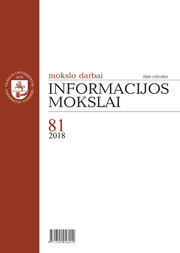POLITINIO LYDERIO RETORIKA: NUO SENOVINĖS AGOROS IKI ELEKTRONINĖS DEMOKRATIJOS
THE RHETORIC OF A POLITICAL LEADER: FROM THE ANCIENT AGORA TO ELECTRONIC DEMOCRACY
Author(s): Giedrė VaičekauskienėSubject(s): Political Philosophy, Ancient World, Rhetoric
Published by: Vilniaus Universiteto Leidykla
Keywords: political leader; political leadership; rhetoric; electronic democracy; political communication; deliberative democracy; personalization; populist style;
Summary/Abstract: This article analyzes political leadership that uses rhetoric as one of the means to influence the electorate. Rhetoric denotes negotiatory communication between different individuals aimed at reaching a general agreement. This theoretical discourse reflects on the characteristics of classical rhetoric, established in the practice of citizenship of the Athenian Democracy, appealing to its return and identifying a new era of political communication – the characteristics of electronic democracy, which powerfully transforms the language and relations of the elected and representatives of the society. In a modern virtual agora, the political leader directly informs his electorate, and the internet provides the leader with a wide range of communication tools to influence the voter. The new media creates a new policy and a new political language, which becomes an object worthy of the researchers’ interest. The electronic agora is full of communicative noise, with the prevalence of a fragmentary, scattered, tag cloud rhetoric. The aim of this article is to reveal the issues of reliability of the rhetoric of the modern political leader from the perspective of political leadership constructed on the internet.
Journal: Informacijos mokslai
- Issue Year: 2018
- Issue No: 81
- Page Range: 146-164
- Page Count: 19
- Language: Lithuanian

